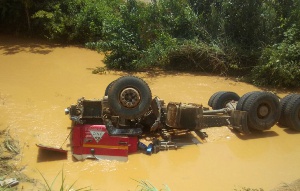Opinions of Saturday, 11 March 2017
Columnist: Badu, K
How Ghanaians are being poisoned with noxious mercury and cyanide
By: Badu, K
It is true that potential economic benefits (employment, tax revenues and development outcomes) can be derived from small-scale mining sector in Ghana.
We cannot also deny the fact that small-scale mining is a significant contributor to the economic and social well-being of many people and households in rural, remote, and poor communities in Ghana.
Nevertheless, the way small-scale mining sector is being managed in Ghana, it does not look favourable. The sector is being managed abysmally.
Apparently, the laws which govern the small-scale mining sector are somehow confused and inconsistent. Indeed, all the attention is basically being focused on the large-scale mining sector, leaving the small-scale mining sector at a substantial disadvantage.
To be quite honest, the regulators laissez faire leadership style may cost the nation dearly in the long run.
Having said that, in order to achieve the maximum benefit, it is extremely important that society as a whole must have an interest in promoting and strengthening the role of small-scale mining in national development.
In addition, the effective implementation of regulations and fortifications towards the developmental potential of the sector must be the topmost importance to the regulating authorities.
It must also be emphasised that societies at large may be both positively and negatively affected by small-scale mining.
The positive effects may include the promotion of efficient resource use, such as extracting ores from small deposits or from tailings, and thus providing the rural folks with incomes.
On the other hand, the negative effects may include, among other things, environmental degradation, water pollution, the release of mercury and other toxic and hazardous wastes into the free environment, and unforeseen social tensions that can lead to civil unrest.
And more so overlapping and conflicting laws, or laws and regulations that are not based on an understanding of the local context of small-scale mining, often hinder and erode the sector’s potential to contribute to sustainable development.
For instance, it is somewhat difficult to establish whether if the interests of the indigenous people are consistent with those of the small-scale miners.
And what is more, while some indigenous people may secure their livelihoods from small-scale mining, there may be other instances in which non-indigenous small scale miners (Chinese illegal miners) threaten the livelihoods of the indigenous people.
For instance, in spite of the fact that by law, only Ghanaians are allowed to obtain mining licenses for small-scale mining operations, “thousands” of Chinese and other foreigners are working in the small scale mining sector in Ghana.
“The involvement of the Chinese has changed the dynamics of small-scale mining,” the head of the Ghana Chamber of Mines, said in an interview.
“They use bulldozers, pay loaders and really heavy machinery. They have in fact mechanized artisanal mining and as a result the level of environmental devastation is huge.”
Worst of all, some greedy and unpatriotic Ghanaians are colluding with the Chinese illegal miners to forcibly dig our natural resources, destroy the environment and terrorise the rural folks.
Disappointingly, this illegal practice is making nonsense of the essence of the enactment of the small-scale mining laws.
Apparently, the small-scale mining law was promulgated to allow native Ghanaians to engage in small-scale mining legally, with a view to engaging them in a meaningful employment.
However, some obdurate Ghanaians have been abusing the small-scale mining law over the years. Sources have it that, often, Ghanaians would secure plots of land, and then go into partnership with the Chinese who have funds to bring in the bulldozers and all the other big equipment.
Obviously, there are lapses in the 1989 small-scale mining law (PNDCL 218). For example, the law states categorically that no licence for small-scale gold mining operation shall be granted to any person who is not a citizen of Ghana. Strangely, however, the same law allows a Ghanaian licence holder to seek logistics assistance from their foreign minions.
Consequently, some Ghanaian licence holders would more often than not go beyond the stated jurisdiction and involve the foreigners in the mining operations.
Indeed, the epochal violations of the small-scale mining law go to show that there is a break down in the sector. To me, the sector requires overhaul.
Let us face it, better data and policies are needed to get the sector back on track.
So, going forward, the 1989 small-scale mining law has to be amended. The amendments must make it unlawful for any Ghanaian to transfer small-scale mining licences to their foreign minions, and must also prohibit allocation of mining lands to the illegal miners.
The fact of the matter is that at the moment, the small-scale mining sector is in a complete mess. Thus, I will venture to propound that if possible, President Nana Akufo-Addo must suspend all the activities in the small-scale mining sector whilst the authorities restore sanity into the system.
Even though my commendation may seem extremely draconian, I am afraid, if proper care is not taken, some greedy and obnoxious Ghanaians will continue to denude the environment, pollute the water bodies and inadvertently poison Ghanaians with mephitic substances such as mercury and cyanide.
K. Badu, UK.













